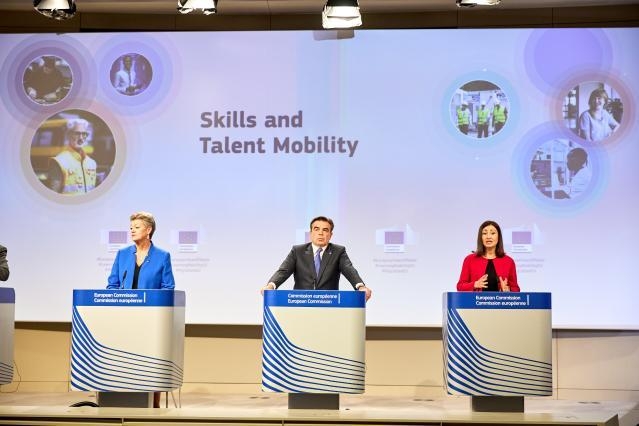The European Commission presented on Wednesday a non-binding Skills and Talent Mobility package aiming at making EU more attractive to talent from outside EU and facilitating labour mobility within the EU.
The package addresses shortages in the EU labour market, counters irregular migration and promotes retraining of the work force. It was presented by three Commissioners, Margaritis Schinas, Vice-President in charge of promoting our European Way of Life, Ylva Johansson, Commissioner for Home Affairs, and Iliana Ivanova, Commissioner for Innovation, Research, Culture, Education and Youth.
“With skills at a premium worldwide, the EU’s future competitiveness will be determined by our industry’s capacity to staff its businesses,” Vice-President Schinas explained. “Our drive to fill labour market gaps has to start at home, with robust measures to support the domestic workforce. But labour migration can be an important complementary means of filling persistent gaps.”
By the package, the EU also enters the “global race for talent”. The package consists of three components.
The first component is the EU Talent Pool, which is expected to become a game-changer, according to the Commission. It is the first EU-wide platform matching employers in the EU directly with jobseekers of all skills levels, all around the world.
Participation in the EU Talent Pool will be voluntary for the member states, who will support the management of the platform. It will also provide information on recruitment and migration procedures in the member states and includes strong safeguards to ensure fair recruitment and working conditions.
The EU Talent Pool will cover all types of labour and skills on the “talent ladder” (low, medium and high skilled workers), including for example long-term care workers. “This is an area where the talent pool makes perfect sense,“ the Vice-President told The Brussels Times. “The demographic problem (aging population) is well-known.”
The working age population will decline from 265 million in 2022 to 258 million in 2030 in the EU. The pool can make a difference for this much-needed work force considering the fact that many of the care workers find themselves in a shadow and unregulated situation, he added.
The EU Talent Pool will additionally support the implementation of Talent Partnerships. These are tailor-made partnerships with non-EU countries, providing mobility for work or training. Jobseekers who have developed their skills under a Talent Partnership will receive a Talent Partnership Pass, visible to the participating employers, that certifies their qualifications.
The Commission is currently steering the development of Talent Partnerships with five partner countries (Egypt, Morocco, Tunisia, Bangladesh and Pakistan), which are moving towards implementation, with concrete programmes and roadmaps being defined.
The opportunities for legal migration can be expected to disincentivise irregular migration and must go hand in hand with strengthened cooperation on readmission cooperation, Commissioner Johansson underlined.
It not possible to estimate how many “talents” will be recruited but the intention is to recruit as many as possible if they will match the vacancies.
Statistics shows that the current unemployment rate remains low (6.0% in September 2023). However, the job vacancy rate rose to 2.9% last year – more than double the level of 2012. This means that nearly 3% of jobs across the EU are sitting vacant, even after efforts to upskill, reskill and activate the domestic workforce.
The second component of the package is a Commission recommendation on easier and faster recognition of qualifications of third country nationals.
The aim is to develop the capacity of national recognition authorities to simplify and expedite procedures by improving comparability of third country qualifications and of how to assess jobseekers' skills. This will allow for recognition decisions to be taken quickly and with confidence to fill vacancies in EU shortage occupations, in particular in priority regulated professions.
The recommendation stops short of harmonizing EU rules on recognition of qualifications of third country nationals but will go some way in addressing “brain waste” and facilitating the procedures in the members states.
Vice-President Schinas exemplified with the situation during the COVID-19 pandemic when thousands of physicians and nurses from third countries, already residing in the EU, could not be employed in the national health-care systems because their qualifications were not recognized.
What we are doing now is to reduce the barriers, time and costs related to the recognition of skills and qualifications, he explained. “This is a first step. We hope that all this will help but don’t exclude using legislation later.”
The third component is a proposal for a Council Recommendation on Learning mobility opportunities for everyone.
The proposed Council Recommendation ‘Europe on the move’ aims to boost mobility in all areas of education and training. It invites member states to make learning mobility within the EU an integral part of all education and training pathways, from school education and vocational education and training, notably apprenticeships, to higher and adult education and youth exchanges.
The Commission proposes to set new ambitious goals for 2030: increasing the share of mobility experience to at least 25% for higher education graduates, at least 20% for learners with fewer opportunities, and at least 15% for vocational learners. The member states will have to draft national action plans on how to achieve the goals.
The Commission's proposal for an EU Talent Pool will now be negotiated by the European Parliament and the Council. The Commission will support member states' implementation of the Recommendation on recognition of qualifications of third country nationals, and invite them to report on national initiatives, reforms, good practices and statistics.
The Recommendation ‘Europe on the Move' will be submitted to the Council for its consideration and adoption.
For further information about the package, click on the Communication and Questions & Answers.
M. Apelblat
The Brussels Times

